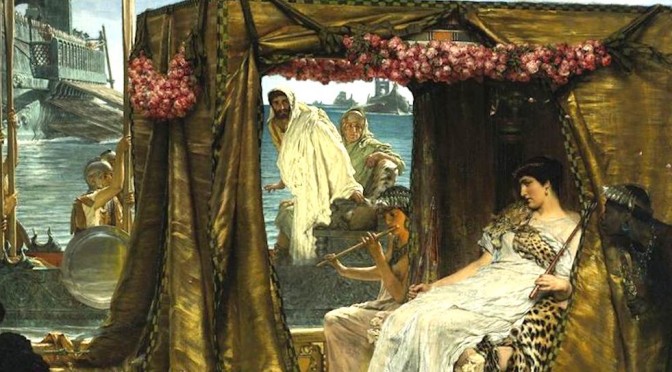After the subdivision of the Empire at the treaty of Bologna, Antonius retired to the east and set up a base at Tarsus, a good strategic choice to support his intention to invade Parthia. He contacted Cleopatra almost immediately. Conventional history says it was because he needed her financial support for the invasion of Parthia.
As part of the Egyptian consiracy however there is nothing more predictable than that two senior members of the Pharonic family meet with the specific objective of ensuring the succession.
The Pharonic family believed in and practiced line breeding. For Cleopatra to produce children by both Caesar and Marcus Antonius they must both have been Egyptian and be of the same Egyptian faction
From Plutarch (But remember he might not be right and that these words might not actually be his)
Cleopatra’s arrival at Tarsus
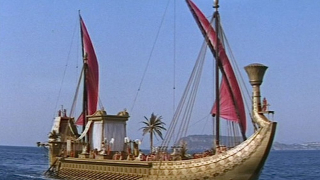 “She came sailing up the river Cydnus in a barge with gilded stern and outspread sails of purple, while oars of silver beat time to the music of flutes and fifes and harps. She herself lay all along, under a canopy of cloth of gold, dressed as Venus in a picture, and beautiful young boys, like painted Cupids, stood on each side to fan her. Her maids were dressed like Sea Nymphs and Graces, some steering at the rudder, some working at the ropes.
“She came sailing up the river Cydnus in a barge with gilded stern and outspread sails of purple, while oars of silver beat time to the music of flutes and fifes and harps. She herself lay all along, under a canopy of cloth of gold, dressed as Venus in a picture, and beautiful young boys, like painted Cupids, stood on each side to fan her. Her maids were dressed like Sea Nymphs and Graces, some steering at the rudder, some working at the ropes.
…perfumes diffused themselves from the vessel to the shore, which was covered with multitudes, part following the galley up the river on either bank, part running out of the city to see the sight. The market place was quite emptied, and Antony at last was left alone sitting upon the tribunal; while the word went .through all the multitude, that Venus was come to feast with Bacchus for the common good of Asia.
On her arrival, Antony sent to invite her to supper. She thought it fitter he should come to her; so, willing to show his good humor and courtesy, he complied, and went. He found the preparations to receive him magnificent beyond expression, but nothing so admirable as the great number of lights; for on a sudden there was let down altogether so great a number of branches with lights in them so ingeniously disposed, some in squares, and some in circles, that the whole thing was a spectacle that has seldom been equaled for beauty.
The next day, Antony invited her to supper, and was very desirous to outdo her as well in magnificence as contrivance; but he found he was altogether beaten in both, and was so well convinced of it, that he was himself the first to jest and mock at his poverty of wit, and his rustic awkwardness. She, perceiving that his raillery was broad and gross, and savored more of the soldier than the courtier, rejoined in the same taste, and fell into it at once, without any sort of reluctance or reserve.
For her actual beauty, it is said, was not in itself so remarkable that none could be compared with her, or that no one could see her without being struck by it, but the contact of her presence, if you lived with her, was irresistible; the attraction of her person, joining with the charm of her conversation, and the character that attended all she said or did, was something bewitching. It was a pleasure merely to hear the sound of her voice, with which, like an instrument of many strings, she could pass from one language to another; so that there were few of the barbarian nations that she answered by an interpreter.”
Holiday in Egypt
“Antony was so captivated by her, that while Fulvia his wife maintained his quarrels in Rome against Caesar by actual force of arms, and the Parthian troops…were assembled in Mesopotamia, and ready to enter Syria, he could yet suffer himself to be carried away by her to Alexandria, there to keep holiday, like a boy, in play and diversion, squandering and fooling away in enjoyment that most costly, as Antiphon says, of all valuables, time.
Were Antony serious or disposed to mirth, she had at any moment some new delight or charm to meet his wishes; at every turn she was upon him, and let him escape her neither by day nor by night. She played at dice with him, drank with him, hunted with him; and when he exercised in arms, she was there to see.
At night she would go rambling with him to disturb and torment people at their doors and windows, dressed like a servant woman for Antony also went in servant’s disguise, and from these expeditions he often came home very scurvily answered, and sometimes even beaten severely, though most people guessed who it was. However, the Alexandrians in general liked it all well enough, and joined good humouredly and kindly in his frolic and play, saying they were much obliged to Antony for acting his tragic parts at Rome, and keeping his comedy for them.”
Parallel Lives
Interestingly the title of this part of Plutarch’s writing is “Parallel Lives”. Perhaps he was trying to tell us something?
In 40 BC Anthony had already fathered Cleopatra’s twins, Cleopatra Selene and alexander Helios.
Apparently unconcerned by this his wife, Fulvia and his brother Lucius Antonius, supported by those whose lands had been taken by Octavian to distribute to legionaires, rebelled in Italy.
Antonius had already sired two sons by Fulvia, Marcus Antonius Antyllus and
Iullus Antonius.
This rebellion had the support of the senate, who in theory had control of the Italian peninsula.
Octavian overcame the rebellion. Lucius and Fulvia and Fulvia’s two sons were exiled from Italy but those who suffered were the senators who supported the revolt. Three hundred of them were executed in the aftermath.
Treaty of Brindisi
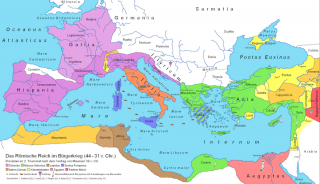 In response Anthony invaded Italy, but once again there was conference rather than conflict. At Brindisi, Antonius agreed to marry Octavia, Octavian’s sister. he also gave up Gaul. His attention was now firmly focussed in the east.
In response Anthony invaded Italy, but once again there was conference rather than conflict. At Brindisi, Antonius agreed to marry Octavia, Octavian’s sister. he also gave up Gaul. His attention was now firmly focussed in the east.
Antonius and Octavia
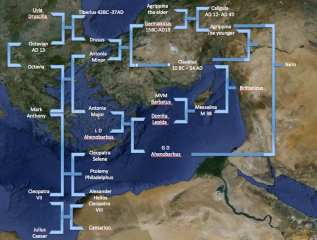 From this point on Antonius divided his time between his residence in Athens occupied by Octavia, Cleopatra’s palace in Alexandria and campaigning in Judea, Media and Parthia. Octavia gave birth to two daughters, Antonia Major and Antonia Minor who became the Matriarchs of the Julio Claudian dynasty of Roman Emperors.
From this point on Antonius divided his time between his residence in Athens occupied by Octavia, Cleopatra’s palace in Alexandria and campaigning in Judea, Media and Parthia. Octavia gave birth to two daughters, Antonia Major and Antonia Minor who became the Matriarchs of the Julio Claudian dynasty of Roman Emperors.
Antonius daughters by Octavia were of course nieces of the Emperor, but without further explanation it is rather surprising to discover it was Antonius as much, if not more, than Octavian who fathered the dynasty.
Antonius and Antonia
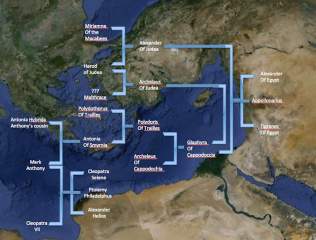 Earlier in his life Antonius had married Antonia Hybrida his cousin, who he divorced for infidelity with his best friend. His daughter from this marriage married a rich greek, Polydothorus of Trailles and her granddaughter married into the Herodian family of Judea, not once but twice.
Earlier in his life Antonius had married Antonia Hybrida his cousin, who he divorced for infidelity with his best friend. His daughter from this marriage married a rich greek, Polydothorus of Trailles and her granddaughter married into the Herodian family of Judea, not once but twice.
Antonius and Glaphera
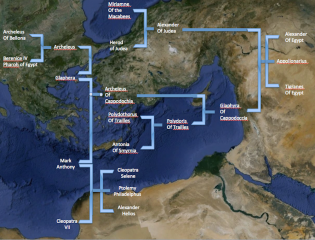 This Genealogy though widely published is problematical in the extreme. Archeleus of Bellona Jr is extremely unlikely to have been born to Berenice IV of Egypt. His father and Berenice were only rulers of Egypt for six months before they were deposed by Aulus Gabinius and Antonius in 55BC.
This Genealogy though widely published is problematical in the extreme. Archeleus of Bellona Jr is extremely unlikely to have been born to Berenice IV of Egypt. His father and Berenice were only rulers of Egypt for six months before they were deposed by Aulus Gabinius and Antonius in 55BC.
However it is possible that Berenice was also his “un-named” first wife who simply invited Acheleus Sr to join her after she came to power. Acheleus Jr is supposed to have married a greek Glaphera.
In 36 BC Antonius found time to depose the King of Cappadocia, Ariarathes X and place Acheleus Jr’s son, confusingly also called Acheleus to that throne. This gave rise to roumors then and now that ‘Glaphera’ was not what she seemed and that Antonius was the father of the third Acheleus.
The third Acheleus then went on to marry Polydoris Of Trailles.
If this is so then a son of Antonius married a grandaughter of Antonius before marrying into the Herodian Family. Very Egyptian! But why the Herodians, they were an obscure Arab family from Idnumeaand or Nebatea, weren’t they?
There is an explanation of why the descendants of antonius married into the Herodians. It is because the Herodians were also descended from Antonius.
Family likeness?
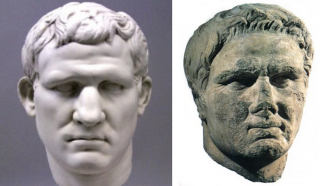 These are busts of Antonius and Herod both as young men. There are clear similarities, The person known as Antipater, Herods father became an advisor to the Maccabees, hereditary leaders of the Jews at a time of dispute between the brothers Hyrancus and Aristobulus. The romans became involved in the feud, in fact they entered Judea specifically because of the feud. They decided to back Hyrancus but then put a strong man alongside to assist with governance.
These are busts of Antonius and Herod both as young men. There are clear similarities, The person known as Antipater, Herods father became an advisor to the Maccabees, hereditary leaders of the Jews at a time of dispute between the brothers Hyrancus and Aristobulus. The romans became involved in the feud, in fact they entered Judea specifically because of the feud. They decided to back Hyrancus but then put a strong man alongside to assist with governance.
The strong man was known as Antipater and it was explained that he had served the previous generation of rulers as governor of Idumea, In fact this was Antonius as a young man, given an alias to camouflage from the jews that they were being controlled by a Roman. At the first opportunity he appointed his sons, Herod and Phasael as governors of galilee and jerusalem respectively.
Antonius and Antipater
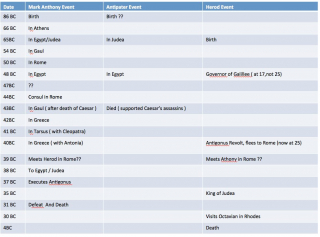 Though this was a difficult (and potentially dangerous mission to accomplish it is possible, and the dates are an acceptable match. The exception is that he seems to be in Gaul too early.
Though this was a difficult (and potentially dangerous mission to accomplish it is possible, and the dates are an acceptable match. The exception is that he seems to be in Gaul too early.
It would have left six years in which there was no Antipater in Judea. However what we do not know is wether he stayed in Gaul for the winter. campaigns in the north were fought in the summer months!
Antonius and Cypros
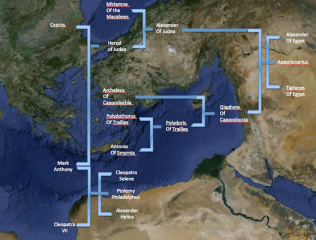 It is known that Antonius had a marriage and children when he was very young. Strabo says that the wife’s name was Fadia but in Judah she could have been called Cypros,
It is known that Antonius had a marriage and children when he was very young. Strabo says that the wife’s name was Fadia but in Judah she could have been called Cypros,
The family tree
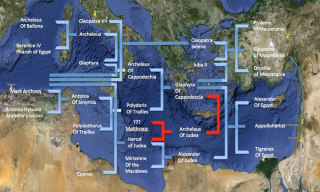 Combining all this information it can be seen that the overall picture is typical of the liner breeding program practiced by the Egyptians and it meant there were lots of potential partners in Judea
Combining all this information it can be seen that the overall picture is typical of the liner breeding program practiced by the Egyptians and it meant there were lots of potential partners in Judea
